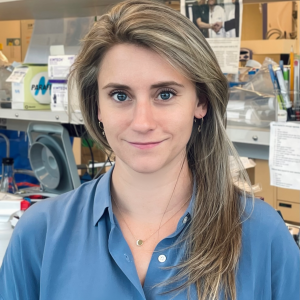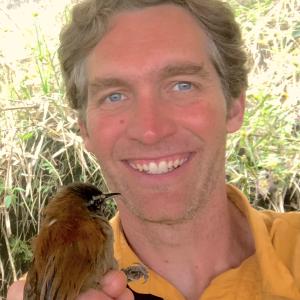New Faculty Spotlight
Get to know the two new faculty members we welcomed in Fall 2023 and Winter 2024!

Annelise Snyder is originally from Ashby, Massachusetts and received BA degrees in Biology and Chemistry from Williams College in 2011. She then worked as a research technician with Dr. Igor Brodsky at the University of Pennsylvania, where she studied host-pathogen interactions related to bacterial virulence factors and their inhibition of innate immune pathways. She conducted her doctoral training with Dr. Andrew Oberst in the Immunology program at the University of Washington, where she examined how manipulating different forms of inflammatory programmed cell death (PCD) within melanoma tumors can promote anti-tumor immune responses. As a graduate student, she also studied how neuronal PCD signaling influences immune responses to flavivirus
infection of the central nervous system (CNS). After completing her PhD in 2019, she joined Dr. Susan Kaech’s group at the Salk Institute for Biological Studies in La Jolla, California as a postdoctoral fellow, where she investigated immune contributions to Alzheimer’s disease pathogenesis. Dr. Snyder then moved back to Seattle from 2021-2023 for a second postdoctoral position with Dr. Cyrus Ghajar at the Fred Hutchinson Cancer Center, where she studied innate immune responses to early metastatic breast cancer cells in the brain, as well as T cell immunotherapy strategies to eradicate breast cancer cells from common metastatic organs.
Professor Snyder has a long-standing interest in understanding mammalian innate immune responses, particularly in the context of cancer and within the CNS. Her research at WWU will center on defining how innate immune cells called macrophages interact with tumor cells during breast cancer brain metastasis. This work will involve characterizing inhibitory pathways that shut down a macrophage’s ability to target tumor cells, as well as investigating how extracellular matrix proteins within the CNS modulate macrophage activation and function. She is very excited to move to Bellingham, finally start her own research program, and teach classes at Western! Outside of work, Annelise loves hiking and backpacking with her dog (Wallace), road trips in a Ford Econoline van with her husband (Duncan), gardening, live music, mid-2000s pop culture references, and learning how to forage for mushrooms.
Chris Templeton was raised in the Midwest, growing up in Ann Arbor Michigan and attending college at Denison University in Ohio. As an undergraduate, he studied both music and science, receiving a BS in Biology in 1999 and gained his first research experiences. His love of both animal communication and chickadees began during Masters work at the University of Montana where he was mentored by Erick Greene. He then completed a PhD in Mike Beecher’s lab at the University of Washington, where he studied how young sparrows learn to sing. Following his PhD in 2009, Prof Templeton received an NSF Fellowship to work with Peter Slater at the University of St Andrews in Scotland. During this time, he commuted to field sites on the west coast of Mexico to

study vocal duetting and song learning in small birds called happy wren. At St Andrews, he also studied social learning as a postdoctoral fellow with Kevin Lala and established his own independent research group of undergraduate and PhD students when he received a UK NERC fellowship in 2012. Building on a love of teaching and mentoring undergraduates, he joined the Biology faculty of Pacific University in Oregon, where he was an Assistant and Associate professor from 2015-2023, before moving to Western Washington University.
Professor Templeton’s research interests are focused on the evolution and ecology of avian behavior. Current projects examine the sophisticated information encoded in communication networks of chickadees and other local songbirds, duet song learning of neotropical wrens in Ecuador, and how anthropogenic noise pollution impacts animal communication and cognitive processing. He is thrilled to be moving his lab to Western and joining the Biology and larger WWU communities. His family—wife Annie, daughters Mara and Aila, and goldendoodle Dougie—are also excited about living in Bellingham and everything the PNW offers. In his free time, Chris enjoys sailing and paddling, hiking and camping, listening to and making music, and spending time with his family.
Professor Templeton's research was recently published in Nature Communications journal: American crows that excel at tool use activate neural circuits distinct from less talented individuals. Below is a summary, written by Dr. Chris Templeton:
What happens in an animal’s brain when it learns to use new tools to solve novel problems? Loma Pendergraft led a collaborative research team to examine how the brains of American crows changed as they learned to solve a complex foraging task based on one of Aesop’s fables. Crows needed to use rocks as tools to raise the water level high enough to access an otherwise inaccessible food reward. By using relatively non-invasive neural imaging technology (FDG-PET), it was possible to repeatedly map birds’ brains over time and demonstrate how neural regions change as animals learn new tool use behavior. Because individual crows varied in how well they learned this challenging task, we could also show variation in neural activation related to tool use proficiency, with those individuals learning the task activating circuits associated with sensory processing and proficient individuals instead activating neural circuits associated with tactile control.